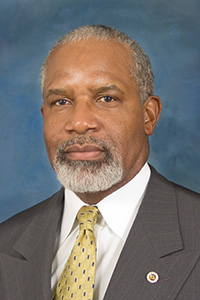A Quiet Difference
Harry Jones

Photo courtesy of Harry Jones
During the late 1960s and early 1970s, ideological battles over issues of race were raging throughout North Carolina. Often the conflict centered on education—and people like Harry Jones who crossed the boundaries of expectations.
Though Jones attended high school in Southern Pines before busing laws changed the education system, he still chose to go to the integrated school across town.
When Martin Luther King Jr. was killed, his school's flag was not lowered to halfmast. Jones was upset, so he led a walkout: “I went to the black students and said, ‘We're going to go out here, and we're going to pray around this flagpole, and then we're going to walk off campus,’ and they all followed me. Sometimes you just do things because you think it's the right thing to do.”
In 1971, Mecklenburg County became the national centerpiece of the integration debate when Swann v. Charlotte-Mecklenburg Board of Education went to the Supreme Court. On April 20, the Court ruled that busing was a legitimate means for achieving integration of public schools. This country still has vivid memories of the vocal—and sometimes violent—reaction to the Court's mandate.
There is poetic beauty in the fact that Jones now serves as Mecklenburg County Manager. He has played a quiet but significant role in the nation-wide cultural shift—the shift from the days of Martin Luther King Jr. to Barack Obama.
Jones has walked through ugly persecution with quiet leadership. The subtlety of his humility and dignity rings louder than any message amplified by a megaphone; he invites respect through the warmth and strength of his presence.
While Jones says he “had to overcome the deep hurt that you would sometimes experience just by comments that some might make,” he spoke highly of his time at the University of North Carolina at Chapel Hill during both undergraduate and graduate school, where he completed his Master's in Public Administration.
“We had wonderful professors and a very successful class,” Jones says.
Jones says that his family has been the most important part of his success. “My leadership skills were honed by my mother and father, who always impressed upon me the importance of giving to others,” he says. “Once you learn that the most important thing in life is giving rather than receiving, it's easy to give back to people.”
• Jeremy Cramer


